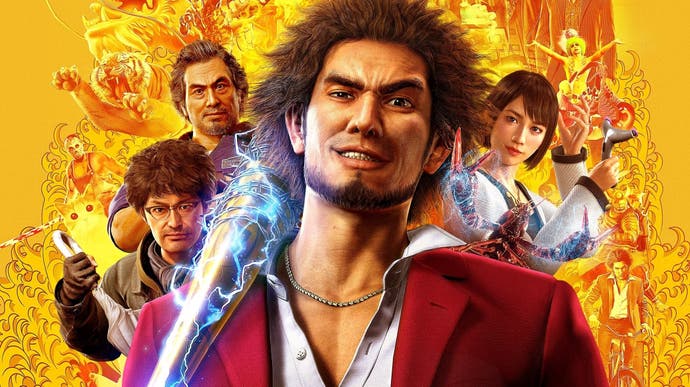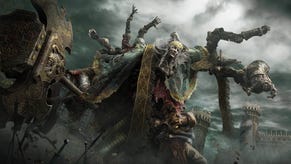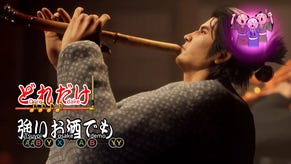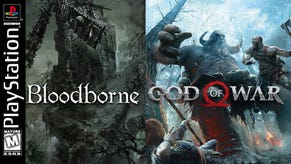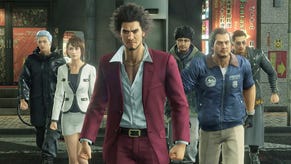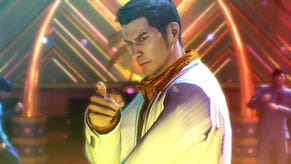Yakuza: Like a Dragon review - Yakuza goes JRPG, for better and for worse
Our neighbours the yakuza.
Ryu Ga Gotoku Studio's big message with Yakuza: Like a Dragon, purposefully not called Yakuza 7, is that the yakuza need to evolve - both the real and the virtual ones. Accordingly, Like a Dragon makes a break from its past in both its story and systems, ironically enough by referencing Dragon Quest, an RPG renowned for taking a staunchly traditionalist approach with its latest instalment.
Our new hero is Kasuga Ichiban, an expressive, kind-hearted doofus unlucky enough to have been born at a soapland, a massage parlour and the closest Japan gets to a brothel. Kasuga isn't just a hero by his own designation, he's inherently good to the point of naivety, which isn't a good trait to have in his profession. In an echo of former Yakuza protagonist Kazuma Kiryu, his strong loyalty and belief in others lead him to go to prison for the patriarch of his yakuza family. When he gets out 18 years later, he's greeted with a bullet to the chest and dumped in the fictional district of Isezaki Ijincho in nearby Yokohama.
Eventually Ichiban will get entangled with the three crime syndicates that control Ijincho, but it's a long slog to that point. I can live with the long intro that's customary for the Yakuza franchise at this point, where you barely move your character five steps before there's another cut scene, but here you are in the double digit hours before the game has finished explaining every aspect of its new combat system, and it takes even longer before something akin to a plot begins to emerge.
Let's just address the elephant in the tatami-lined room: the move from action combat to a turn-based system works well. That's mostly because fights are pretty dynamic. Both your enemies and your allies move around, so you want to make sure to down as many foes as possible with an area attack or throw them so they land near one of your friends for an automatic follow-up attack. Sometimes, albeit rarely, one of your characters will pick up objects near the enemy and use them to attack, emulating the way you could weaponize anything from traffic cones to bikes in previous games.
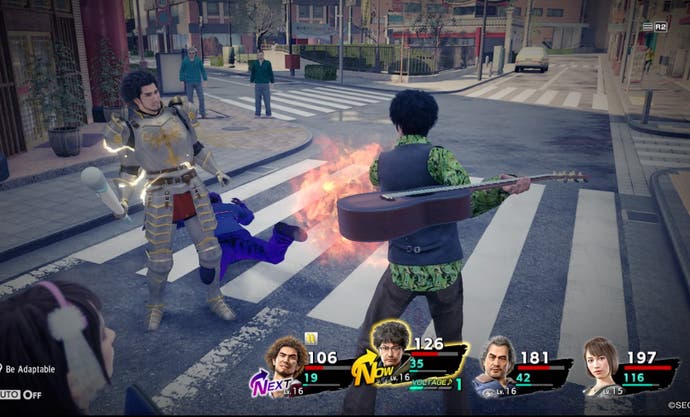
Attacks feel as impactful as ever, and the enemy types are a real treat - there's anime fanboys equipped with glowsticks, perverts who slip on their own lube, shady cult members, which have somewhat of a tradition in Yakuza by now, and many, many more. The best addition comes in the form of the new job system, which you unfortunately won't unlock until several chapters into the game. Since Ichiban starts his life in Yokohama jobless and homeless, he has to go to the job centre just like everyone else, where he and his friends are able to pick from a variety of jobs which change their appearance, attacks and special skills. It's not only a good way to keep things fresh, it's also very funny - as a host you spray enemies with a giant bottle of champagne, the cook wields serving platters and whisks, just to name a few. Jobs have their own levelling system however, which can make changing between them a bit of a hassle since you start each job with a noticeable cut to attack power and HP and may need to grind for a while lest you run into a main story battle underpowered.
Balance becomes a real issue in battle, and it's the system's main downfall. An enemy's level says next to nothing about them in terms of power - I've come across battles in which someone more than ten levels below me, and supposedly weak to my attacks, took ages to take out due to their ridiculously long health bar. I've fought boss battles in name only, with the main boss on the ground, long-defeated, while I spammed his underlings with the most effective attack each of my characters had available, swiftly growing bored.
Length and the low difficulty are the main problems, and I suspect Like A Dragon knows it's pretty easy, too, otherwise there would be no reason to penalise losing as heavily as it's done here: if Ichiban falls in battle, things end even if his team mates are still standing, and in regular battles you lose half of your money before respawning. In boss battles, you can pay to be resurrected with half your health or full health, if you don't want to do that then even if you've saved beforehand, as the game regularly tells you to do, you will have to redo parts that can sometimes take half an hour, simply because you can't save while you're already in a "dungeon".
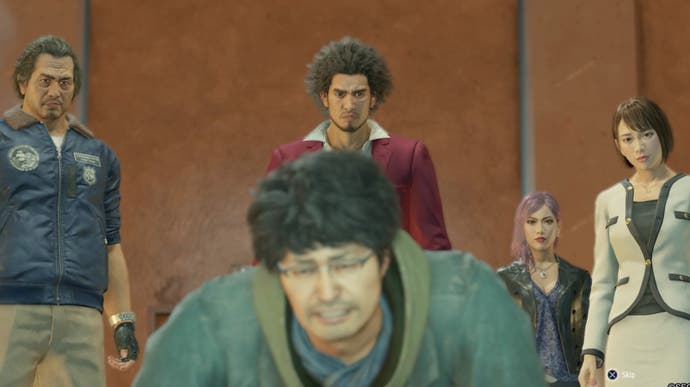
Yakuza has found a new home in Yokohama. I loved having a whole new city to explore, and while Yokohama isn't as visually distinct as Kamurocho or Sotenbori, the process of growing familiar with it is satisfying. It's too early to say if it will be a permanent setting, synonymous with the franchise reboot in the same way Kamurocho was with Kiryu's adventures, but I can say one thing for certain - it's too damn big. It's three times larger than Kamurocho, but while that sounds good on paper, in reality you get one densely populated area the size of Kamurocho and two that are just about empty and at no point relevant to the main story, so unless you make a point to uncover them for substories, collectibles or just to see what's there, they have no function. I'm okay with that for the most part. Traversal is smoother than in Judgement, which tended to stutter. On PS4 there's a bit of pop-in, but it's not overly noticeable. Sometimes all you have on the map are rows of grey office blocks, which don't make for a tantalizing open world to explore, but that's on Japan, not on Sega.
The series' side content has become infamous for providing players with goofiness where the main story often does the exact opposite and side activities that allow you to engage in virtual tourism. But to me the substories are another area where the novelty's beginning to wear off. Note you will likely feel different on this point if you haven't played 15 years worth of Yakuza games, but to me it feels like most of the oft-mentioned "wacky", or memorable stories are getting much rarer. I've always found the disconnect between Kiryu's scary looks but gentle persona made for the best stories, the ones where he wondered, silently despairing, what he'd gotten himself into this time. Judgement had some interesting private eye-type substories. Ichiban just rocks up somewhere, offers his help, as a good hero is wont to do, and from then on, other than decking a creep, there's actually fairly little for him to do - a lot of quests simply had me listening to stories completely without my involvement. Yakuza 0 will likely forever be my champion when it comes to substory variety.
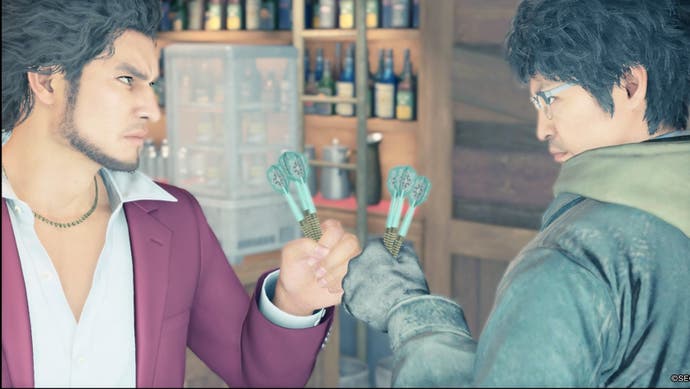
When it comes to other optional activities, Like a Dragon really shines. While well-known stuff like the Sega arcade and karaoke are available, you're almost discouraged from using them. The batting cages are hidden away in a lonely corner of the map, the selection in the UFO catchers is drab. Instead, why not try racing other homeless people for cans to recycle or take part in Dragon Kart, a kart racer with not one, but several different race tracks? My personal favourite has to be the minigame about trying to not fall asleep at the arthouse cinema.
Like a Dragon grapples with the series' own potential obsolescence the way yakuza do with theirs. While it's never been a main focus, each game has been good at charting actual yakuza history - whether it's breaking into real estate management or using legitimate businesses as fronts, yakuza had to adapt several times in the face of legislation fighting organised crime. Like a Dragon's story has arrived in the present, and thus focuses on the present state of the yakuza with unexpected candour - at its core, it's a story about yakuza making headway into politics, rather than infighting between fictional clans.
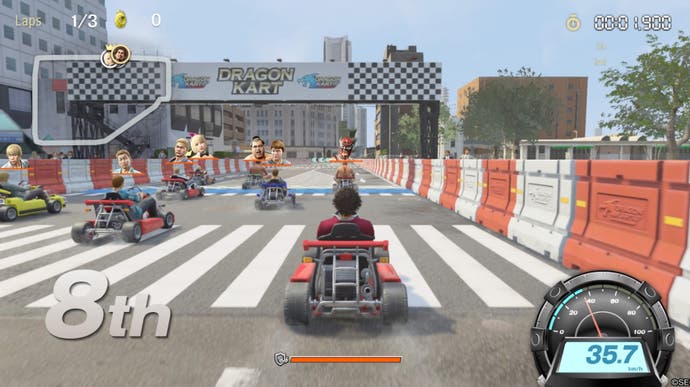
Given this, I found RGG Studio's romantic approach inappropriate at times. It's difficult to invest in the idea that a soapland owner really just had "his girls" best interests at heart, knowing that in real life these establishments have ties to human trafficking. The game doesn't shy away from calling politics a perfect stepping stone for yakuza to establish themselves, only to go and start a war on their own people. It's an odd balancing act between "would someone think of the poor criminals" and quite sophisticated criticism aimed at real conditions, the real-life ties between Japanese right-wing politicians and yakuza which in recent times came to light via several bribery scandals. But for the game this means that there's no easily identifiable villain anymore, and that sometimes, the message the plot sends is that crime is necessary and therefore right. I don't know how I feel about that. What I do know however, is that it's too big a subject to want to tackle with one idealistic dope and a handful of his homeless friends.
Yakuza: Like a Dragon is a good game - sometimes it's okay, sometimes it's great, sometimes it made me groan. It runs the full gamut of emotions, from boredom to disbelief. The will to reinvent itself is there, and that means not everything works - whether you'll enjoy it or not depends on what aspects you care about the most.
